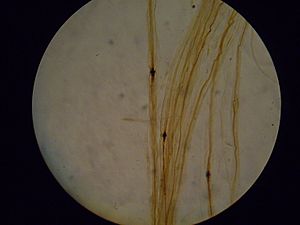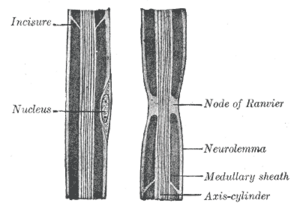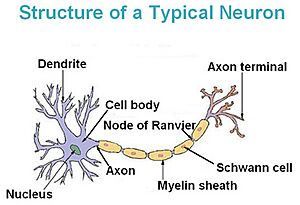Node of Ranvier facts for kids
Nodes of Ranvier are tiny gaps found along the axon of a nerve cell. Imagine a long wire that carries electrical signals. This wire (the axon) is usually covered in a fatty layer called the myelin sheath. This myelin acts like the plastic coating on an electrical wire, helping the signal travel fast.
However, the myelin coating isn't continuous. It has small, regular breaks or gaps. These gaps are the Nodes of Ranvier. They are very important because they help nerve signals move super quickly through your body!
Contents
What Are Nodes of Ranvier?
These special gaps are full of tiny doors called ion channels. These channels allow tiny charged particles, called ions, to move in and out of the axon. This movement of ions is how nerve signals (also called impulses) are created and passed along.
Because the myelin sheath insulates most of the axon, the nerve signal can't easily escape or enter along the covered parts. But at the Nodes of Ranvier, the signal can be "recharged" or boosted.
How Nerve Signals Jump
When a nerve signal travels down an axon, it doesn't just smoothly glide along. Instead, it seems to "jump" from one Node of Ranvier to the next. This special way of moving is called saltatory conduction.
The word saltatory comes from the Latin word saltare, which means "to hop or leap." So, the nerve signal literally hops or leaps over the insulated parts of the axon, only touching down at the nodes. This makes the signal travel much, much faster than if it had to move along the entire length of the axon without these jumps.
This jumping action is why your brain can send messages to your muscles, and your senses can send information to your brain, almost instantly!
Who Discovered Nodes of Ranvier?
The Nodes of Ranvier are named after the scientist who first described them. His name was Louis Antoine Ranvier.
Louis Antoine Ranvier's Work
Louis Antoine Ranvier was a French pathologist, which means he studied diseases and how they affect the body. He was born in 1835 and lived until 1922. In 1878, he published his detailed observations of these gaps in the myelin sheath. His discovery was a big step in understanding how our nervous system works.
His work helped scientists understand how nerve signals travel so efficiently, which is crucial for everything from thinking to moving.
Images for kids
See also
 In Spanish: Nodo de Ranvier para niños
In Spanish: Nodo de Ranvier para niños
 | Frances Mary Albrier |
 | Whitney Young |
 | Muhammad Ali |






